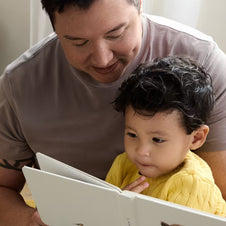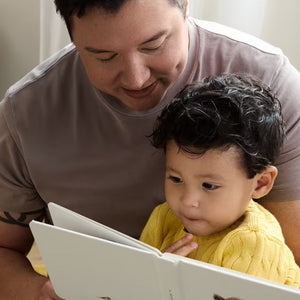Does your baby’s sleep feel tricky? Or maybe sleep seemed predictable and easy last week, and now it just feels off? You might be seeing a sleep regression. Let’s talk about what sleep regressions look like and how to handle them.
What is a sleep regression?
“Sleep regression” is a common phrase used to describe a temporary disruption in your child’s sleep, like waking more in the night, taking shorter naps, or fighting bedtime. This is common during times of developmental growth or big transitions (think: starting preschool or the birth of a sibling). Sleep can be impacted anytime your little one’s brain is busy focusing on physical, mental, social, or emotional growth.
What’s the science behind sleep regressions?
When a baby’s brain is busy learning new things or developing, sleep can take a back seat.(3, 8) Also, as babies grow, their sleep needs change.(2,6,7) This means a baby may begin to struggle with more night wakings, with nap refusals, and with falling asleep. When sleep is interrupted this way, it can feel like everything is moving backwards, hence the term “sleep regression.”
However, sleep isn’t actually going backwards or permanently “regressing.” Sleep skills don’t just disappear at magical ages. When I talk about common sleep regression ages, I’m talking about ages when babies and toddlers often experience periods of development (physical, cognitive, social) or commonly have a change in sleep needs (Think fewer naps, more awake time, etc..). But truly, all babies develop at their own pace, meaning sleep could be interrupted because of new skills, cognitive progressions, or physical shifts at any age.
What are common sleep regression ages?
During a baby’s first year, sleep regressions are most commonly seen around 4 months, 8-10 months, 12 months, and 18 months, There are also a few common sleep regressions during the toddler years around 2 years and 3 years.
Some parents also notice sleep changes around 6 months or 14-15 months. Since all babies develop at a different pace, it’s possible to see a sleep regression at any age.
What are signs of a sleep regression?
Every baby experiences sleep regressions differently. If your baby is going through a sleep regression, you may notice your baby:
-
Is now fussy all the time and won’t sleep unless you hold them.
-
Was a pro-napper before, but simply won’t nap anymore.
-
Starts crying every time you head to the nursery.
-
Is standing and crying in their crib at naptime.
-
Is waking multiple times in the middle of the night when they were previously sleeping well.
-
Used to nap well, but now has short naps.
-
Begins to wake at 4:00 am when this wasn’t an issue before.
-
Seems to be acting differently when it comes to sleep and you’re unsure why.
Expert Tip: Whenever a child has a sudden change in their sleep, we want to start by ruling out any physical concerns like sickness or teething.
Is it teething or a sleep regression?
The only sure sign of teething is seeing a tooth. Prior to that tooth popping through the gums, you may notice swollen gums or a white nub. The 24-72 hours before a tooth erupts is typically the time of the most discomfort. If your sleep struggles are lasting for weeks instead of days, this is rarely associated with teething.
If your little one is struggling with pain, do what needs to be done to help soothe them. It’s always okay to comfort your baby while they're in pain. Rest assured that providing comfort for a few nights won’t derail a solid sleep foundation. Once that tooth pops through the gums, go right back to your approach to sleep, and sleep will return to normal quickly.
Important Note: If you’re seeing sudden changes in your baby’s sleep with periods of intense crying, let’s check for signs of an illness or other physical discomfort.

Text version of Signs of Teething vs Signs of a Sleep Regression
| Signs of Teething | Signs of a Regression |
|---|---|
| + Swollen gums with white nubs | + Protesting naps or bedtime |
| + Irritability | + Waking in the night |
| + Less interested in solids | + Early morning wakings |
| + Chewing on fingers and toys | + Short naps |
| + Increased drooling | + Increased separation anxiety |
How long do sleep regressions last?
When you maintain healthy sleep habits and have a plan to get back on track, sleep regressions typically last for a week or two. On the other hand, inconsistency or throwing healthy sleep routines out the window can cause a sleep regression to turn into a long-term struggle. Be sure to check out my tips for how to get your baby’s sleep regression to pass more quickly.
If sleep seems to be falling apart in the middle of a regression, please know that you don't have to just wait it out and hope for the best. My classes will meet your little one right where they are developmentally. There's no need to wait, you can start now. Choose your little one's age to get started:
Taking Cara Babies Classes
Do all babies have sleep regressions?
While all babies do experience developmental progressions, these progressions do not always impact sleep. That means, not all babies will experience EVERY regression. Many babies who already have a healthy sleep foundation experience fewer sleep interruptions and move through sleep regressions more quickly(1).
How do I handle a sleep regression?
Here are my tips for helping your baby during a regression:
1. Pay attention to changing sleep needs.
As babies get older, their wake windows change (They may even be ready to drop a nap!). Make sure that your little one has appropriate wake windows for their age. This will help them have enough sleep pressure - not too much and not too little - to fall asleep and stay asleep.
2. Practice new skills during awake time.
Practice new skills during the day. Working on new physical and cognitive skills during awake time makes them less exciting when it’s time to sleep.
3. Plan for active awake time.
Babies need active awake time. Fill their wake windows with activities that allow them to use their brains and bodies. Getting that physical and mental activity during the day will help your baby sleep better for both nights and naps.
4. Keep bedtime in the sweet spot.
Most babies do best with a bedtime between 7:00-8:00 pm (2). This time is typically when little ones fall asleep the easiest and stay asleep the longest.
5. Understand the changes happening in your baby’s brain.
Sleep regressions are a result of developmental progressions. Understanding what is happening developmentally for your baby will help you support them during awake time, which will make sleep easier.
6. Maintain healthy sleep habits.
Being consistent with your approach to sleep helps to move through a sleep regression more quickly. Sleep regressions can last 1-2 weeks, but letting go of healthy sleep habits during this time can lead to ongoing struggles.
7. Start with a great little sleeper.
A healthy sleep foundation can reduce the impact and length of a sleep regression. If you’re struggling with your child’s sleep, I can help! Whether you have a newborn (0-4 months) or baby (5-24 months) my classes will help you create a customizable plan to achieve more consistent and restful sleep for everyone in your family, even during regressions.










